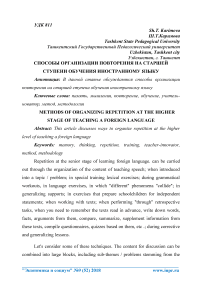Methods of organizing repetition at the higher stage of teaching a foreign language
Автор: Karimova Sh.T.
Журнал: Экономика и социум @ekonomika-socium
Рубрика: Основной раздел
Статья в выпуске: 9 (52), 2018 года.
Бесплатный доступ
This article discusses ways to organize repetition at the higher level of teaching a foreign language
Memory, thinking, repetition, training, teacher-innovator, method, methodology
Короткий адрес: https://sciup.org/140239708
IDR: 140239708
Текст научной статьи Methods of organizing repetition at the higher stage of teaching a foreign language
Repetition at the senior stage of learning foreign language. can be carried out through the organization of the content of teaching speech; when introduced into a topic / problem; in special training lexical exercises; during grammatical workouts, in language exercises, in which "different" phenomena "collide"; in generalizing supports; in exercises that prepare schoolchildren for independent statements; when working with texts; when performing "through" retrospective tasks, when you need to remember the texts read in advance, write down words, facts, arguments from them, compare, summarize, supplement information from these texts, compile questionnaires, quizzes based on them, etc .; during corrective and generalizing lessons.
Let's consider some of these techniques. The content for discussion can be combined into large blocks, including sub-themes / problems stemming from the general and related to those sub-themes / problems that have been worked out in previous years. The analysis of high-school students of interest, discussed by them and in their native language, makes it possible to single out four such blocks as the basic ones: leisure problems; education and professional activity; all about yourself and others around you; teenager's problems. Each block is studied for six months. The number of sub-topics / problems within it depends on the number of hours and the preparedness of the class.
When modeling specific situations, various combinations of these milestones are made, with respect to which the speech task is put. So, in the block "Problems of leisure" are allocated: How organized leisure in our school / our city? How can I spend my free time in Tashkent / London? How did our parents spend their free time in their childhood / youth? How have my interests changed since childhood? Learning a language is a hobby or a profession? The attitude of my classmates / parents / teachers to various forms of leisure (to sports, broadcasting, television, reading newspapers, etc.). The list can be continued, focusing on specific students and the teaching time available to the teacher. In exercises of a situational nature, speech tasks and communication partners will vary. Speech tasks are formulated on the basis of the following general activities: classification, distribution (for example, words on any principle); selection of examples, drawing up of lists, lists; determining the correct sequence, links; definition of cause-effect relationships (why), explanation; definition of conditions, circumstances; separation of the main and secondary; comparison, comparison, search for similarities and differences; combining, combining, summing; addition, restoration of the full image of the details; change, transformation; hypothesis hypothesis, guessing, supposition; argumentation, proof, allotment “dissatisfied and satisfied” generalization, conclusions, reduction; correction, correction; search for a possible solution, design; planning; expression of evaluation, expression, ranking; recommendation, advice; agreement / disagreement; fantasy, representation of unreal conditions.
Список литературы Methods of organizing repetition at the higher stage of teaching a foreign language
- Бим И.Л. Основные направления организации обучения иностранным языкам на старшей ступени полной средней школы/И.Л. Бим//Иностр. языки в школе. -2002. -№5. -С. 7-11.
- Немов Р.С. Психология: Учеб. для студентов высш. пед. учеб. заведений: В 3 кн. Кн.1. Общие основы психологии. -3-е изд. -М.: Гуманит. изд. центр ВЛАДОС, 1997. -688 с.
- Хофман И. (пер. с немецкого). Активная память. -М.: Прогресс, 1986. -С. 216, 251-253.
- Ярцев Д.В. Особенности социализации подростка//Вопросы психологии. -1999. -№6. -С. 58


